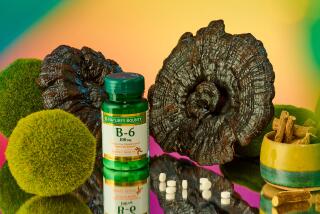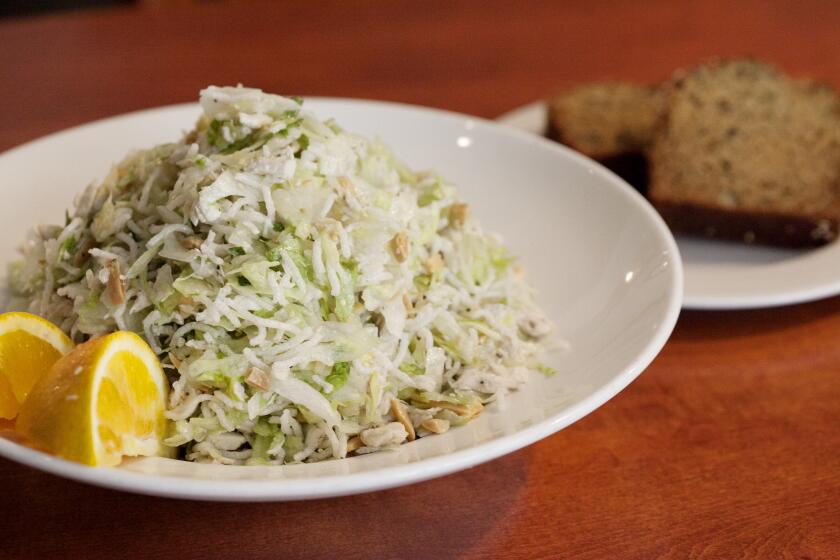Health in a Can?
You’ve seen the ads. A sweet, doddering couple is cruising slowly down the highway of life when suddenly, out of the dust, another elderly, but sexier, couple in an open-top convertible zooms past, leaving the first couple to wonder: “Are we missing out on something?”
The dear but pathetic-looking couple was clutching Ensure, the leading nutritional drink, while the totally awesome seniors were guzzling Sustacal, its rival “meal in a can.”
Fade in on a pretty and wholesome woman who is supposed to be a harried young mother but looks more like an aerobics instructor. She is holding a can of Boost, yet another nutritional drink and the newest product from the makers of Sustacal. “No, there isn’t a fountain of youth,” she confides, “but you can help keep your body at its best with Boost.”
The ads take direct aim at health-conscious Americans who are addled by the constantly changing wisdom on subjects such as oat bran, red wine and even the food pyramid. We are (or want to be) convinced that we need to eat better, but no matter what we do, it seems we’re still not doing it right. A meal in a can sounds like the perfect solution for those who are hungry for the definitive word on what to eat.
Alas, it is not. Nutritionists say there is no reason for a healthy adult to take regular doses of nutritional drinks in place of meals.
“The fact is, most of us don’t need these meal replacements, because we can eat food,” says Bonnie Liebman, director of nutrition at the Washington-based Center for Science in the Public Interest.
“The implication is that everything you need from food you can get from cans,” she says. “That’s baloney.”
Ensure, which is manufactured by Ross Laboratories, and Sustacal, a product of Mead-Johnson, were developed more than 20 years ago for hospital patients who had difficulty eating--for example, cancer patients undergoing chemotherapy.
They also have been available in pharmacies to people who are recovering from surgery, suffering from gum disease or gastrointestinal problems, or are unable to gain weight.
Recently, however, the drinks have been pitched to healthy seniors as a way to add that ever-elusive oomph to their lives. Ads show attractive, active, 60-something couples toasting each other with glasses of Ensure, their bicycles leaning on a nearby tree.
The ads also say, “Ensure is recommended No. 1 by doctors as a complete source of nutrition.” And although it is true that Ensure accounts for 80 percent of the nutritional drinks sold, doctors recommend it largely for bed-ridden or debilitated patients.
“Doctors may recommend Ensure,” says Liebman, “but not for the people pictured in this ad. Until recently, the vitamin-fortified, soy-based drink was fed only to the very old or very sick, usually under a physician’s orders and often through a feeding tube.”
Judith Bavoso, chief clinical dietitian at the Parker Jewish Geriatric Institute in New Hyde Park, N.Y., says she has complained to the Ross Laboratories representative who supplies Ensure to her institute. “I find the commercials to be misleading,” she says. “You have this healthy-looking woman with her daughter in the garden and you get the impression that she’s that way because she drinks Ensure. She’s that way because she’s eating a proper diet and she’s not ill. It has nothing to do with Ensure.”
With that ad in mind, the Center for Science in the Public Interest last month cited Ensure and the Ross Products Division of Abbott Laboratories for the worst food ad of the year.
“With ads like this one, Abbott Labs is cashing in on the fears and anxieties about health troubling millions of older people and their adult children,” the center said in issuing the “award.”
The drinks are sold in 8-ounce cans for $1 to $2. They usually are found in supermarkets and drugstores alongside diet drinks such as Ultra Slimfast and meal replacements such as Carnation Instant Breakfast. The main ingredients, which are not listed on the can, are water, sugar, oil, soy and milk protein and a vitamin pill, Liebman says.
The drinks come in a variety of flavors, including chocolate, and they taste like a very sweet, heavy milkshake.
The drinks have about 240 calories per can, about the same as a McDonald’s hamburger. Sustacal contains 29 grams of sugar, the same as a Snicker’s candy bar.
Liebman points out that Mead-Johnson and Ross Labs are two of the largest manufacturers of baby formula. “They want the entire population, from infancy to old age, drinking formula,” she says.
A Ross spokeswoman, Suzanne Priore, declined to be interviewed, saying that the company’s policy is to not discuss marketing strategy.
Clearly, there is tremendous allure in the notion of a complete meal in a can. Sales of Ross Labs’ Ensure have grown nearly 58 percent in the past year, to $161.1 million, according to Information Resources, a market research company.
Mead-Johnson is fighting for its share of the lucrative market with a double-barreled approach: new, sexier ads to revive sales of Sustacal, and the introduction in October of Boost, primarily for aging baby boomers.
“What we’re doing is creating a new category of product,” says Peter Paradossi, a spokesman for Mead-Johnson. While Ensure and Sustacal are intended for the elderly, Boost was launched specifically for active, healthy people from 25 to 54. Mead-Johnson would not release sales figures for Boost.
The idea behind the product is that today’s adults are busier but at the same time more health-conscious than ever. They skip meals and feel guilty about it.
“We have to look at the real world and real-world food solutions,” says Joan Horbiak, a nutritionist who works for Mead-Johnson. “Parents are running errands during lunch. So many companies have downsized, people feel guilty being seen in the lunchroom. They’re skipping breakfast, skimping on lunch and megadosing on dinner.”
In a perfect world, families would sit down together for three meals a day. But for most people, she says, a meal in a can is “a pretty palatable option.”
However, even that scenario doesn’t make sense to other nutritionists. Alice Fornari, director of the dietetic internship program at C.W. Post campus of Long Island University, says that although nutritional drinks are not harmful if taken occasionally, they are unnecessary.
“There are things you can eat quickly if you have to,” she says. “You can pick up a yogurt and a roll and have a complete meal. How much planning does that take?”
The group most vulnerable to the pharmaceutical companies’ advertising, nutritionists say, is the elderly. Even those in good health can have trouble preparing three meals a day for themselves. They can suffer from loss of appetite because they are isolated or because they are taking medicine.
But the best solution for those problems, nutritionists say, is healthful food. “Food contains things we don’t yet know about,” says Susan Braverman, who heads the dietetic internship at Queens College in New York. “This [supplements] should be left for people who can’t, for a variety of reasons, eat food.
“And food,” she adds, “is for enjoyment. I think that somehow we have to take time to do that.”
More to Read
Eat your way across L.A.
Get our weekly Tasting Notes newsletter for reviews, news and more.
You may occasionally receive promotional content from the Los Angeles Times.










